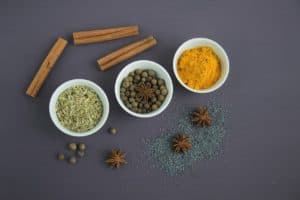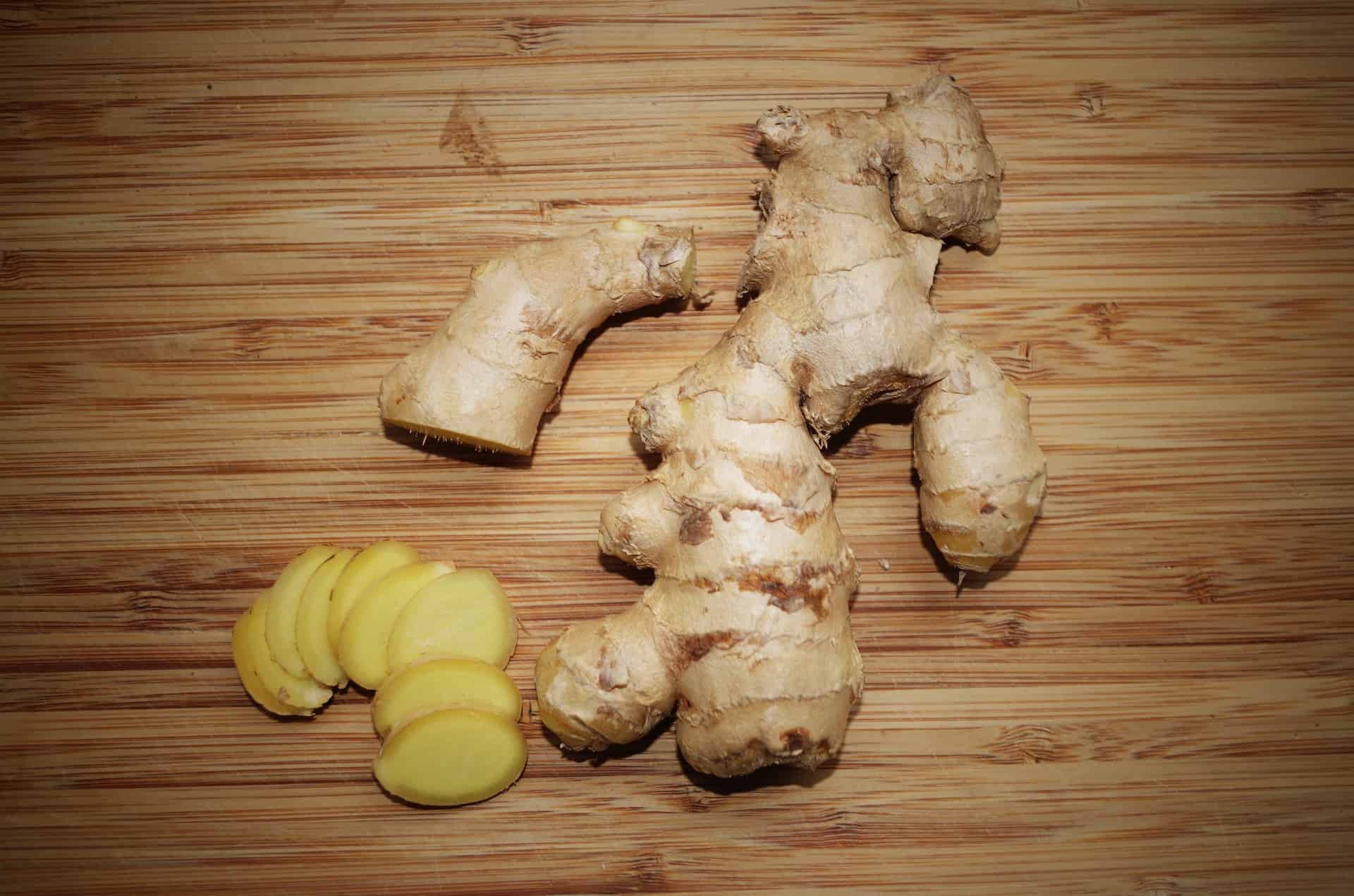Contents
Although they are not sure of its exact origin, it is believed to originate in India. While this plant no longer grows wild, it is currently grown in India, China, Nepal, Mexico, Thailand, and several other countries throughout the world.
It is a member of the Zingiberaceae medicinal plant family that includes turmeric and cardamom which have many health benefits as well. These plants have tuberous rhizomes, which is a Greek word for mass of roots. Turmeric is a very important spice with many health benefits, but many people take it the wrong way and don’t get them. This article goes over the correct way to get the health benefits of turmeric.
Vendors most commonly sell ginger as either fresh (raw) or in powdered form. Ginger root has a light brown skin. Once peeled, it will reveal a bright yellow flesh inside. People best describe it as having a warm, bitter, spicy flavor with a little bit of sweetness and a pungent aroma.
To create the powder, they first dehydrate the root. Then after it is completely dried out they grind it down. Therefore, some recipes will list it as ground ginger. Although the pale yellow ginger powder has the same taste profile, it is less profound.
Health Benefits of Ginger Root
Many cultures have been using ginger as a medicine dating back at least 3000 years. It is well known in Ayurvedic medicine which takes a more holistic approach to health using herbs, exercise, and lifestyle recommendation. In addition, modern science has also studied the effectiveness of ginger as a healing plant and many studies have supported that claim.
Certain key oils exist inside the plant including gingerol and shogaol. These oils are relatives of capsaicin, the active oil in chili peppers. There have been various studies on the effectiveness of each oil.
Antioxidant
At 3.5 mmol per 100 grams, ginger is one of the foods with the most antioxidants. What also makes it special is that it contains at least 25 different forms. You may be wondering, what does that mean?
First of all, oxidative stress is the leading cause of early aging and disease. This happens because free radicals are formed as a side effect of your body’s metabolism. As unstable oxygen molecules escape, they wreak havoc on your organs and tissues. Finally, scientists also connect higher levels of free radicals with stress, chemicals, and pollutants. Antioxidants have the ability to offset them. In conclusion, this will help prevent disease and premature aging.
Anti-Inflammatory

Various studies on animals and humans have demonstrated that whether through the regulation of calcium levels, increased oxygen production, or by inhibiting COX-2 suppression, ginger has the ability to reduce chronic inflammation.
Chronic inflammation is responsible for a lot of problems inside the body. Heart disease due to narrow passages, blood vessels and arteries, digestive issues, muscle pain, and even swollen joints are all related to inflammation. As a result of decreasing it, we allow the body to function properly and allow healing to occur. Read more about how to reduce inflammation in our other article.
Anti-nausea
Ginger’s anti-nausea property is the most famous medical use throughout history. Has anyone ever told you to drink a ginger ale if you have an upset stomach?
Research has shown that the oils collect in the gastrointestinal tract. Therefore, it would appear that this is the reason that ginger is a remedy for nausea. A better idea is to skip the sugar and make yourself some ginger tea the next time you are feeling nauseous. Read this article that answers the question of why is soda bad for you. Studies have shown that as little as 1 gram of ginger per day has proven to be very helpful in counteracting nausea.
People often find that drinking a few cups of ginger tea throughout the day helps settle their stomach.
Aids in Blood Flow

Aside from the benefits listed above, some evidence points to the fact that ginger has a protective role in heart health and blood flow. Although some studies demonstrate that ginger can lower the risk of clotting, reduce blood pressure, and cholesterol levels, other conclude that there is no noticeable effect. As doctors study it more, we will be able to get a better idea for the impact on heart health.
Culinary Ginger Uses
Ginger is mostly known for its culinary uses. With a complex flavor profile, it is commonly used in various dishes and drinks from. From savory to sweet foods, it is very flexible. Some of the more common uses are listed below.
Ginger Tea
Many commercial products are available in supermarkets everywhere where you just need to add hot water, but many choose to make their own homemade versions. If shopping for one, try to choose a high quality organic brand. Yogi has some really good ones, and I personally like the Lemon Ginger flavor. It is very soothing on your throat and is also very relaxing. Plus, it also helps to reduce blood sugar levels!
This recipe is the best way to get all the benefits. Most recipes make the mistake of only using either the ginger powder or the fresh ginger. By combining the two, you get both medicinal properties of the shogaols and gingerols.
Desserts
Most know ginger as the star in a few classic baked desserts. The most common one is the special Christmas dessert known as gingerbread. From beautifully decorated houses to little men, this famous dessert dates back to at least the 10th century.
Ginger cookies and gingersnaps are also widely known, but did you know that ginger is also an ingredient in pumpkin pie?
Ginger Juice
With juicing becoming very popular, ginger is a common ingredient in many juices. Whether they create fresh juices at your local market or you have a juicer at home, adding a small amount of it can be beneficial. Try adding the fresh ginger to a combination of other ingredients such as kale, apples, and carrots. Not only do you get a nice flavor boost, but also get to enjoy the health benefits.
If fast and easy is appealing to you, many natural stores and supermarkets have a juice counter with several options that contain ginger root. On the other hand, if you wanted to experiment for yourself and make them at home, Breville makes some of the best quality juicers on the market.
 Spice Blends
Spice Blends
Often linked with Indian foods, ginger is common in a variety of blends. These blends are great for rubs to put on meats or even vegetarian dishes such as lentils. Here is a great article that goes over what are lentils. Also found in many Asian cuisines, another famous one is the Japanese spice blend called Shichimi Togarashi. Shichimi is often used in soups and on noodles.
The great thing about blends is that you get to combine the healing traits of many spices. Garlic, coriander, chili pepper, and cumin are some of the other spices that pair well with ginger. You can find more about the individual benefits of coriander at naturemadecures.com/health-benefits-of-cilantro/.
Medicinal Uses
Digestive Issues
Because of the role that ginger plays in reducing inflammation and nausea, its most common use is for a relieve to digestive issues. By lowering inflammation it allows for the easier passage through the digestive tract by minimizing irritation to the intestinal walls. This has shown to have the ability to stop colon cancer.
Studies show that it can increase the flow of saliva and digestive juices which can help foods break down and improve digestive health. Indigestion, heartburn, and diarrhea appear to have a large improvement when ingesting ginger.
Arthritis
Especially relevant, the Arthritis foundation supports the use of ginger to reduce inflammation and joint pain in patients with osteoarthritis and rheumatoid arthritis.
“ In a 2012 in vitro study, a specialized ginger extract called Eurovita Extract 77 reduced inflammatory reactions in RA synovial cells as effectively as steroids.
It also has been studied for OA. In one trial of more than 200 patients, Eurovita Extract 77 improved OA pain after standing and walking.” [4]
Anti-carcinogenic Properties
In various studies in mice, it has shown that gingerol has an effect on suppressing tumors in various cancers. This is believed to be caused by its antioxidant properties. There are also reports stating that it has a level of cytotoxicity towards cancer cells. This would indicate the spice plays a part in killing cancer cells, but would leave the other healthy cells alone.
Even more incredible, when combined together, the ginger and capsaicin benefits of cancer prevention increase even further!
Pain Relief
Humans have been aware of the pain relieving properties of ginger for centuries. It has been topically applied in the case of burns and used as an anti-inflammatory. It “also suppresses leukotrienes (inflammatory molecules) and switch off certain inflammatory genes, potentially making it more effective than conventional pain relievers.”[4] As a result of reducing swelling, movement is easily brought back which also increases blood flow to the area.
Reduce the Effects of Chemotherapy
Negative effects of chemotherapy include nausea and vomiting. Most patients rank these as their most severe side effect. In one study, “A significantly lower prevalence of nausea was observed in the ginger group during 6 to 24 hours postchemotherapy.”[6]
Respiratory Ailments
People have been using ginger for centuries to treat respiratory illnesses. Many scientists believe that its anti-inflammatory properties help open the airways in asthma patients.
Asthma acts by lessening the air flow through the lungs and air passages through inflammatory and mucous buildup. Consequently, by smoothing the lining on the airways and allowing them to open up, there appears to be less of a chance of triggering spasms leading to an asthmatic attack.
Ginger Benefits for Men
There are a few specific benefits for guys that are worth mentioning.
The first one is to use it topically to treat male pattern baldness. Many males claim that rubbing ginger oil on your head daily will help to reverse hair loss naturally. This is supposed to work by reducing inflammation in the hair follicle which allows the hair to regrow.
The second one is using ginger to prevent premature ejaculation and erectile dysfunction. Some claim that the reason for this is due to swelling in your genital area. By using it internally, ginger helps to reduce the inflammation and prevent premature ejaculation.
Maybe they sound far-fetched, but if you have severe issues with either of these, it may be worth a try. You never know how effective they could be. Until then, we can only hope that scientists will study it to find out how effective these treatments are.
Finally, guys can use ginger after a heavy workout to promote recovery by reducing muscle pain.
Benefits For Women
Some ginger benefits are also specific to females.
First off, studies have shown that ginger can reduce the symptoms of menstrual pain which include cramps. If you guessed that the reason is due to reducing inflammatory responses, you are correct! Check out the study here. So the next time you are experiencing menstrual pain, try supplementing with some of this natural remedy.
Secondly, pregnant women can also enjoy its benefits. Adding ginger to your diet can help ease symptoms of nausea associated with morning sickness. But be careful, large doses could raise the risk of a miscarriage.
Finally, it may even be effective in treating ovarian cancer!
Supplement Forms
Being there are many uses for ginger as a herbal medicine, most health food stores carry ginger supplements. It is usually available in different varieties. The list below goes in depth on some of the more popular varieties.
Ginger Capsules
Ginger capsules have been gaining popularity. This is due to the fact that they make supplementing ginger into your diet a quick and easy process.
This is especially helpful for people that do not like the taste or are somewhere cooking or juicing isn’t an option.
It is best to use a high quality organic supplement. Always follow the recommended dose and do not exceed it.
Ginger Extract
This form of ginger can be a little harder to find. Many people enjoy using it as a quick flavor enhancer. Try adding it to drinks and various recipes. Also, the liquid form is great for topical use. An incredible use of the liquid is to place it on the skin as an insect repellent or to heal ailments such as burns.
Ginger Essential Oil
More people are discovering the healing properties of essential oils. The good thing about ginger essential oil is that it are multi uses for it. You can choose to use it topically, internally, or as an aromatherapy. Because it is very strong, you should mix it with a carrier oil before placing it on the skin. Coconut and olive oils are good choices. Also, try using it topically as a pain reliever and also as an antiseptic on cuts and scrapes.
Various products found in the home use it as a scent because of its pleasant smell. Some of its uses include soaps, lotions, and candles and many other household goods. Check out some of these five best essential oil recipes.
Side Effects and Warnings
The United States Food and Drug Administration recognizes ginger as safe to use. There are very few side effects, but you should consult with your doctor before initiating any ginger supplementation plan. It is advised to follow the recommended doses and to stop usage if complications arise. Also, people who are on blood thinning medication such as warfarin should not use ginger without a doctor’s approval.
References:
(1) Herbal Medicine: Biomolecular and Clinical Aspects. 2nd edition. Chapter 7. The Amazing and Mighty Ginger. Ann M. Bode and Zigang Dong.
(2) Antioxidants: Nutrition for Antiaging
